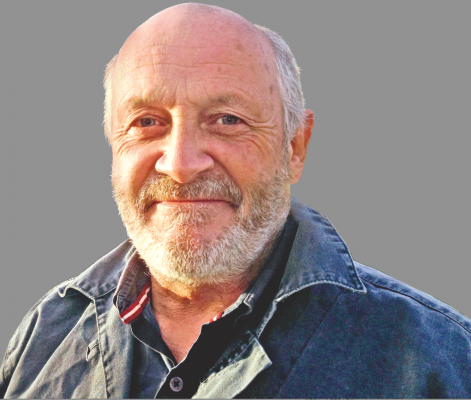Dick Durham February podcast: I’m facing six months hard labour on a chain gang, but
I will have learned new skills at the end of my penance
“The Island Yacht Club, of Canvey Island, is like a recycled town”
I’m on probation. Every Saturday morning I am obliged to join a community service work party to help level roads, repair footbridges and cut grass verges. It’s not as bad as it sounds: there are at least a dozen of us dressed in yellow, high-visibility jackets and working in gangs of four or five to get the jobs done. We are actually trusted with all kinds of potentially lethal tools such as nail guns, power saws and shot-blasters, although admittedly we are behind a barbed wire fence that is always kept under padlock and key.
If all goes well and I complete the next six months on good behaviour, my probationary period will have come to an end. But in that time I will have learned new skills: I can already drive a dumper truck and hope, soon, to master a JCB. Although tea is dispensed at set times I was amazed to learn that even alcohol is available at the HQ, although it is not advisable to indulge while handling mechanical or electrical equipment and I’m certainly not going to blot my copy book.
Six months might seem a trifle harsh as a measure to judge my suitability for membership of the Island Yacht Club, but my fellow members – or should I say my potential fellow members – know that the remarkable matchstick port they have carved out of a post-industrial marsh-scape was not built by lounge lizards.
For the Island Yacht Club, built on the saltings of Canvey Island, itself a reclaimed islet in the Thames Estuary, is like a recycled town. Much of the club’s infrastructure is from dicarded bits, materials surplus to requirement and cast-offs. The workforce comprises everyone from engineers, architects and boatbuilders to managers, computer experts and tradesmen.
Last week I was promoted to the chain gang and, dragging heavy-duty shackles down the slipway, I helped lay up six craft: four bilge-keel Westerlys, an ageing Sunseeker motorboat and a canoe-sterned angling boat. Two travel hoists were towed by tractors working in alternate sweeps and submerged into the swirling waters for the two hours or so we had spare at the top of the tide. When the tide ebbed away I was detailed to pump out two abandoned craft at the far end of the compound. ‘Once they’re dry we can flog ‘em on flea-bay,’ said the yard manager cheerfully. Spare hard standing is at a premium at the Island Yacht Club.
I don’t suppose Oyster Creek, on which the stagings and walkways bristle alongside scores of mud-berth moorings, has supported the eponymous mollusc since Samuel Pepys was suffering a hangover, but the waterway is nevertheless slowly returning to a haven fit for egret, brent goose and teal.
The shallow entrance channel, which connects the club with a tributary of the River Thames, is marked with lit port and starboard buoys, all positioned by club members. So are the smartly painted starboard-hand beacons and the well- tended withies, planted further up the creek as it winds on up past piers and boardwalks.
Canvey Island itself has long been sneered at, almost a national joke among those who know no better; a place where people exist below sea level in pre-fab homes dwarfed by liquefied gasometers, downwind of an obsolete oil refinery.
All that is true, but Canvey is the one place Lemuel Gulliver should have visited, for here the people are as rare a breed as any he came across. They are the most neighbourly folk of any small island I have yet travelled to. They are as friendly as Cypriots, as helpful as the Timorese, and as polite as the Grenadians. There are no conch shells on Canvey Point, but a discarded trainer on the tide line will do. Put it to your ear and you’ll hear the call of the sea.
Dick Durham




